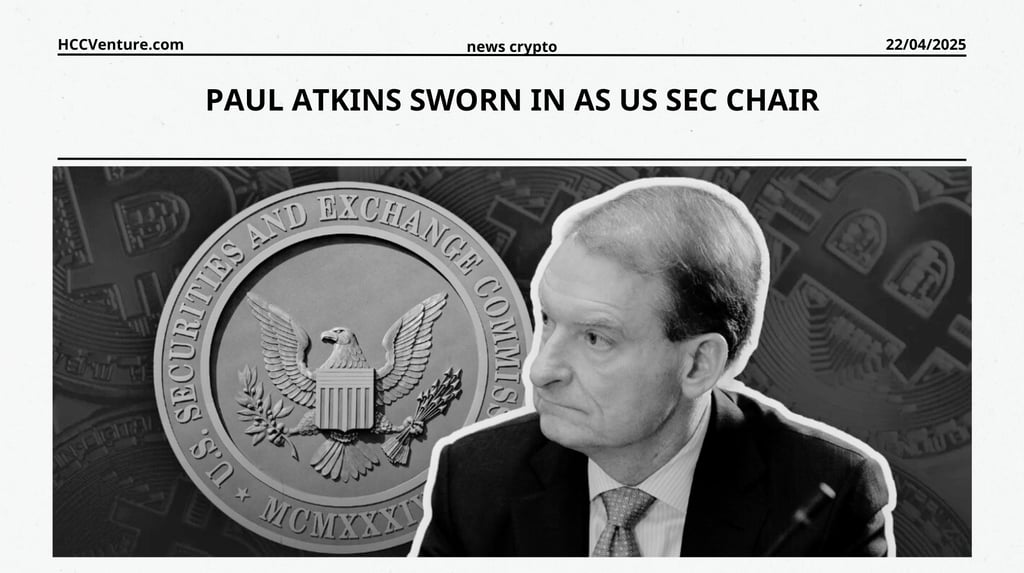Paul Atkins Sworn In As SEC Chairman
Paul Atkins has been officially sworn in as the 34th Chairman of the U.S. Securities and Exchange Commission (SEC), marking a significant moment for the cryptocurrency industry. Appointed by President Donald Trump and confirmed by the U.S. Senate in a 52-44 vote on April 9, Atkins’ ascension to the helm of the SEC has sparked widespread optimism in the crypto community.
4/22/20253 min read


Crypto-Friendly Leader with Extensive Experience at the SEC
Paul Atkins brings a wealth of experience to his new role, having served as an SEC Commissioner from 2002 to 2008 under President George W. Bush. During that tenure, Atkins championed transparency, market-based regulation, and cost-benefit analysis, building a reputation as a proponent of free markets. Prior to that, he served as a staff writer and counsel to SEC Chairmen Richard Breeden and Arthur Levitt from 1990 to 1994, and worked as a corporate attorney specializing in securities offerings and mergers. Since 2017, Atkins has co-chaired the Token Alliance, an initiative of the Chamber of Digital Commerce, where he has promoted clear regulatory frameworks for digital assets. His financial records, which reveal investments of up to $6 million in crypto-related companies such as Anchorage Digital and Securitize, underscore his deep ties to the sector, though they also raise concerns about conflicts of interest.
Atkins’ appointment follows a tumultuous period for the SEC under Gary Gensler, who pursued a “regulation by enforcement” approach. Gensler’s SEC aggressively sued major cryptocurrency companies such as Coinbase, Binance, and Ripple, accusing them of operating unregistered securities exchanges. The strategy was criticized by industry leaders and lawmakers, who said it stifled innovation and pushed crypto businesses offshore. In contrast, Atkins has repeatedly called for a “reasonable, coherent, and principled” regulatory framework to foster innovation while protecting investors. During his confirmation hearing on March 27, 2025, he highlighted digital assets as a top priority, signaling a shift toward clearer rules on token classification, custody requirements, and market structure.
Challenges and criticisms of this event
Despite his optimism, Atkins faces many challenges. His significant investments in cryptocurrencies have come under scrutiny, with critics like Senator Elizabeth Warren questioning his ties to FTX, which his firm, Patomak Global Partners, advised in 2022. Ethics rules may require Atkins to divest these investments to ensure fairness, but the perception of bias could undermine his credibility. Consumer advocacy groups like Public Citizen worry that Atkins’ free-market approach could undermine investor protections, leaving individual investors vulnerable to the volatility and fraud risks of the cryptocurrency market. The collapse of FTX and the sentencing of founder Sam Bankman-Fried are stark reminders of these risks.
Moreover, Atkins must navigate a polarized political landscape. While Republicans like Hester Peirce and Mark Uyeda share his pro-innovation views, the SEC’s only Democratic commissioner, Caroline Crenshaw, is serving an expired term, and two Democratic seats remain vacant. A Republican-dominated Congress could support Atkins’ agenda, but opposition from Democrats and consumer groups could complicate efforts to pass comprehensive crypto legislation. Proposals like the Financial Innovation and Technology for the 21st Century (FIT21) Act, which passed the House in 2024, and stablecoin regulation will test Atkins’ ability to bridge partisan divides.
Balancing innovation with consumer protection is another challenge. While Atkins favors regulatory clarity, he is skeptical of overly detailed regulatory frameworks like the EU’s Markets in Cryptoassets (MiCA) regulation. Instead, he favors “safe harbors” and “regulatory sandboxes” that allow startups to experiment while staying compliant. Critics warn that loosening oversight could exacerbate the volatility of cryptocurrency markets, which are prone to scams and speculative bubbles. Atkins will need to prove that his policies can spur growth without compromising the SEC’s mission of protecting investors.
Future Outlook for the Cryptocurrency Market
Paul Atkins’ appointment as SEC Chairman is a watershed moment for the crypto industry. His pro-innovation stance, combined with his extensive regulatory experience, puts him in a position to deliver the regulatory clarity that crypto companies have long desired. By shifting from enforcement-based policies to structured rulemaking, Atkins could unlock significant growth in the $3.5 trillion crypto market, attract institutional capital, and drive mainstream adoption. However, his success will depend on addressing conflicts of interest, navigating political divisions, and balancing innovation with strong investor protections.
As Atkins begins his tenure, stakeholders will be closely watching his first steps, from approving a potential ETF to developing a comprehensive cryptocurrency framework. There is currently a wave of optimism in the cryptocurrency industry, fueled by the prospect of a more collaborative SEC. Whether Atkins can meet these expectations without undermining the agency’s core mission remains to be seen, but his tenure is sure to be a defining chapter in the evolution of cryptocurrency regulation in the United States.
Explore HCCVenture group
HCCVenture © 2023. All rights reserved.

Connect with us
Popular content
Contact to us
E-mail : sp_contact@hccventure.com
Register : https://linktr.ee/holdcoincventure
Disclaimer: The information on this website is for informational purposes only and should not be considered investment advice. We are not responsible for any risks or losses arising from investment decisions based on the content here.


TERMS AND CONDITIONS • CUSTOMER PROTECTION POLICY
ANALYTICAL AND NEWS CONTENT IS COMPILED AND PROVIDED BY EXPERTS IN THE FIELD OF DIGITAL FINANCE AND BLOCKCHAIN BELONGING TO HCCVENTURE ORGANIZATION, INCLUDING OWNERSHIP OF THE CONTENT.
RESPONSIBLE FOR MANAGING ALL CONTENT AND ANALYSIS: HCCVENTURE FOUNDER - TRUONG MINH HUY
Read warnings about scams and phishing emails — REPORT A PROBLEM WITH OUR SITE.
